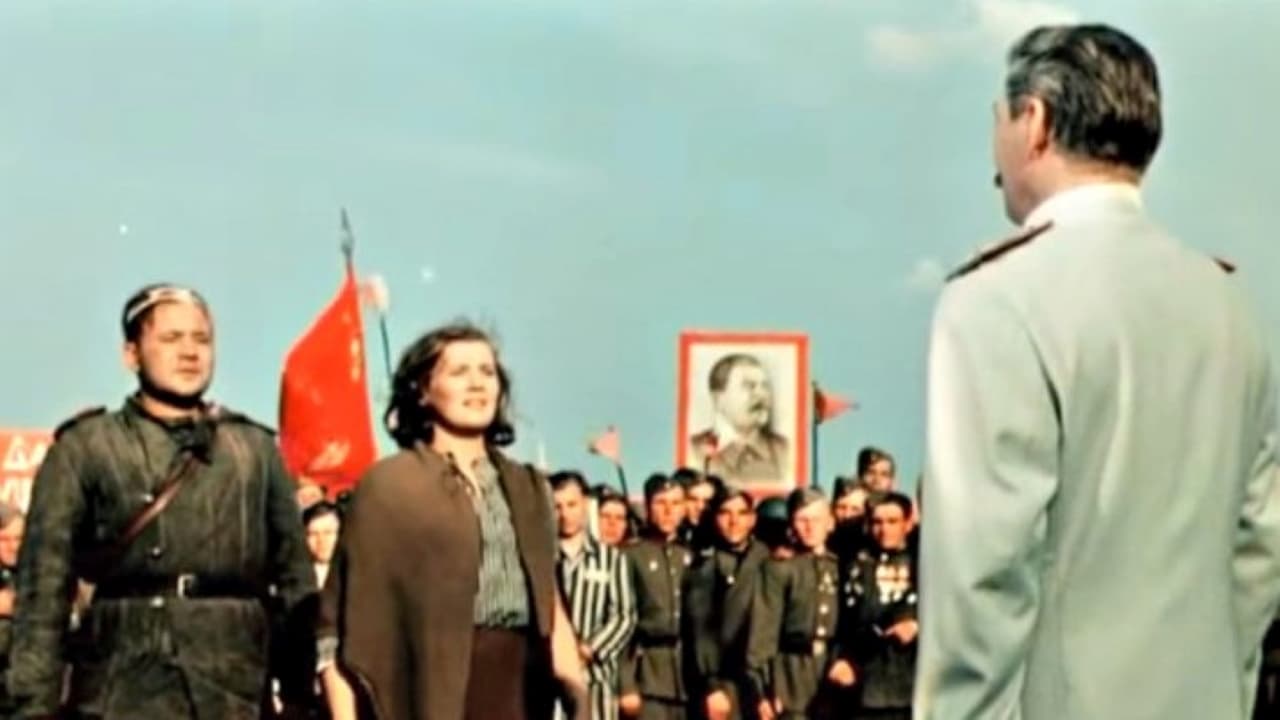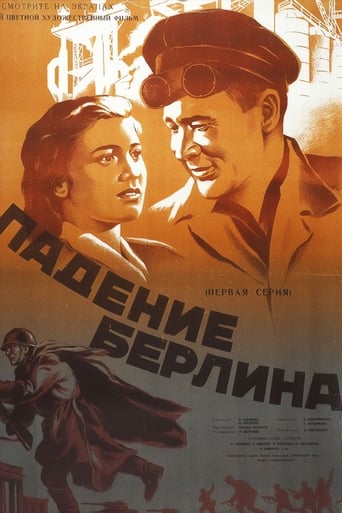

Too much about the plot just didn't add up, the writing was bad, some of the scenes were cringey and awkward,
... View MoreThis is one of the few movies I've ever seen where the whole audience broke into spontaneous, loud applause a third of the way in.
... View MoreI think this is a new genre that they're all sort of working their way through it and haven't got all the kinks worked out yet but it's a genre that works for me.
... View MoreGreat example of an old-fashioned, pure-at-heart escapist event movie that doesn't pretend to be anything that it's not and has boat loads of fun being its own ludicrous self.
... View MoreYou can't hate this movie just because it was made for Soviet intent and purposes. It's a fascinating work of art. While the sotryline is lame and overwritten by the stands of historical figures, it doesn't lose much of its interest. Tchiaoureli, directs one of the very first "kolossal" productions at the time, a 2h45min long picture, depicting the war, the battlefields, the camps, the very last hours of the III Reich and the inevitable triumph of Stalin on the steps of his private jet.The cinematography is quite brilliant, the color very rich and dense, there's a lot of depth, the special effects were kept inside the picture, which gives these spectacular shots of the battlefields. Quite remarkable how Tchiaoureli modeled these decors, sound fx and the burning ruins of Berlin. You have to praise the effort (even though at times the director must've ran out of energy or money for unconvincing fights at the end and real shots of actual footage of Soviet military fanfare ) for trying to reconstitute a catastrophic moment of history into a work of art, tied up in between satire and and spectacle. Hitler's wedding is absolutely hysterical. One of the best scenes of the entire movie. You have to admit, it is hilarious to a degree to see this criminal wedding Frau Eva after being so sure, so sure he would raise Moscow to the ground, and there he is standing 6 meters underground marrying his mistress without much conviction knowing this is the end. A very, very humiliating moment for Hitler, add to that the background orchestra which intentionally makes it even more ridiculous.Many of course tried to disapprove this opposition between the hysterical one-dimensional angrily demoniac Hitler and the poised clever-thinking Stalin, but truth is at these stages of the war, it was pretty much that way. Hitler tried to blow up Germany if it could save his Empire from Soviet conquest. Hell if h ran out of population to enslave and kill, he would've attacked penguins in Antarctica that's how lunatic he was. But be there as it may, the movie is undeniably successful in the mastering of montage, the academic style, a powerful reconstruction of the context, magnificent settings, the scene where Goerring shows his gallery to Krupp quite impressive, the camps at Kalinigrad, the drowning of the German population in the metro under Hitler's orders, how despite all the devastating shooting and bombing the landscape and color are always bright which is interesting, there's an attempt to clearly show "Mother Russia" as never scorned by the War. It's funny the attempt to portray realism and sensationalism. anecdotic behavior and outrageous caricaturing (the scene where Hitler meets Orsenigo and his low humor is met with fake applause and laughs by his advisors). The moments of grave drama are never directed with a tragic tone but the satyrical ones are. It's a very interesting movie that reverses the conventional wisdoms of movie making of the time, with Soviet movie making culture. Not quite Eisenstein or Donskoï we get that, but I would say it's a good compromise between political judgment and artistic research.Also, praise the works of Leonid Kosmatov, Vladimir Kaplounovsky and Shostakovitch's music is excellent, a composer of great talent.
... View MorePerhaps not the most sophisticated film ever made about World War II, but this 1949 Soviet film is a rousing, solid, popular piece of filmmaking. Reportedly made as a present for Stalin's 70th birthday, who took great interest in its production, it was made with considerable production values (for that time) and in great Agfacolor film, taken as war reparation from the Germans. It's a propaganda film alright, but is very well made. As far as I know this was also the first fiction film dealing with the fall of Berlin (though the film, despite its title, deals with all the war in the eastern front, starting from the German invasion of Russia and not just its ending). I'm sure its intended audience – the Soviet masses who just have been through WW2, appreciated the movie. Hitler and his minions (who all speak in Russian in the film) are portrayed as grotesque, pathetic buffoons – but this is not necessarily a bad thing since they are the comic relief of the movie. Also fun is the portrayal of Roosevelt and Churchill at the Yalta conference, the American president is shown as naive and slightly befuddled, the British premier a mean, conniving old man. Stalin, meanwhile, is portrayed through the film as a wise, gentle, all knowing commander leading his country into victory (never mind his well recorded nervous breakdown at the start of Operation Barbarossa). Summing up, despite some historical inaccuracies, this is a very good film, especially for those interested in World War II (note: in this review, I deal with both part I and part II, since the division of the movie in two halves is artificial).
... View MoreThis of course is a pro-Stalin Russian film, but it has other values.First of all, for occidental public, and as many other Russian films of the 40's and 50's, it shows us the almost never watched Russian-side of the II World War.For them it was the "Liberation War", where they lost 18 to 21 million people, more than all the other nation's loses.Something we often forget or simply ignore, so this is an opportunity, from a mere historical view, to look at that "ignored" side of the big war. Keeping Stalin speeches, his battle planning and his final and incredible arrival to Berlin apart, the movie shows good epic moments:the final battle for the Reichstag, the surrender of the German troops in the streets of Berlin, the dialog between the "good worker and soldier" Aloisha with a German officer explaining how they will destroy his city and house as they did with their houses and cities, the final celebration before the(real)ruins of the Reichstag...And also the Hitler's scenes, which constitute a kind of "grand guignol", another movie inserted in the epic film.It's also interesting to see the theories (wether they be only partly true)about Nazis relations with English industrial trusts in the middle of the war, or Hitler's hope of an agreement with Anglo-Americans against Russians, anticipating the Cold War.We the Spanish know something about this, as the fascist Franco was kept in power by the allies, taking advantage of this cold war. "Padeniye Berlina", sometimes boring and a bit theatrical, contains these and many other good scenes, an attractive photographic work (with those Agfa color negatives, so different, but not less fascinating, from the accustomed American technicolor of the time), and a good score. And then , the Stalin omnipresence. But, sceptical as I am in relation to all political regimes, I don't think this propaganda film to be so different from other occidental films of the kind (war, patriotic ones). For me, it's good to get now the opportunity to watch many soviet films we couldn't even know of before the "DVD-era" arrived.They show less propaganda than we could expect (not in this film, of course)and let us know of their daily stories, or their war epics and miseries, so similar to the hundred of stories of American cinema with which we grew up.
... View MoreIn the annals of movies that afford rich entertainment in ways totally unintended by their makers, The Fall of Berlin occupies an honoured place.The story, the vicissitudes of a soldier at the front and his sweetheart in a German forced labour camp, is juxtaposed with sequences of Stalin and Hitler conducting the war.Stalin, wise, kind and, of course, a supreme military leader is a hoot, but it is Hitler who rivets and enthralls. In scenes overdrawn to the point of parody and beyond, all livid blues and menacing shadows, actor V. Savelyev delivers a performance that should have had him sent to the gulag for upstaging his fellow despot. In his final, hilarious scene, his dog Blondi is despached by a spiked canape delivered by Eva Braun during their wedding breakfast - surely the cinema's finest death scene!10 out of 10!
... View More